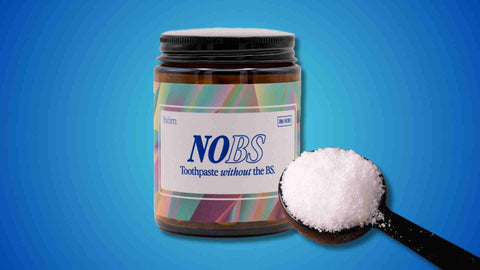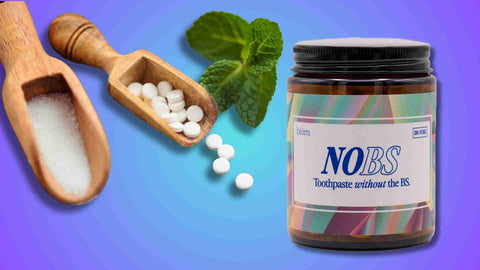Is Baking Soda Good for Your Teeth? A Dentist Explains
Yes, baking soda is good for your teeth. Its natural, gently abrasive qualities make it effective at removing surface stains from your teeth, contributing to a whiter, brighter smile without the need for harsh chemicals.
This mild abrasive action helps in gently polishing away the stains caused by coffee, tea, and other discoloring foods and drinks, making it a natural solution for those of us seeking to enhance the aesthetic appearance of our teeth.
Additionally, baking soda's alkaline nature plays a crucial role in maintaining a balanced pH level in your mouth. It neutralizes harmful acids produced by bacteria, reducing the risk of enamel erosion and tooth decay.
This acid-neutralizing property also contributes to a healthier oral environment, potentially preventing bad breath and promoting overall oral health.
However, it's important to use baking soda correctly alongside remineralizing toothpaste to prevent tooth decay as baking soda does not prevent tooth decay on its own.
In this article, I'll explain everything you need to know about baking soda and its effects on your teeth.
What does baking soda do in toothpaste?

Baking soda, also known as sodium bicarbonate, in toothpaste serves as a gentle yet effective cleaner for your teeth, offering multiple benefits for your oral health.
Its mild abrasive qualities help scrub away surface stains from your teeth, contributing to a brighter, whiter smile without damaging the enamel. This makes baking soda toothpaste an excellent choice for daily use, especially if you're looking to remove stains caused by coffee, tea, wine, or tobacco.
Further, baking soda's natural alkalinity plays a crucial role in neutralizing the plaque acids in your mouth. These acids, produced by bacteria as they digest food particles, can erode tooth enamel and lead to cavities.
By keeping the oral environment more balanced, baking soda not only protects your enamel but also supports overall gum health.
Additionally, baking soda tackles bad breath by addressing its root cause: the acidic by-products of oral bacteria. By neutralizing these acids, baking soda helps freshen your breath, leaving your mouth feeling cleaner and more refreshed.
For those with sensitive teeth, brushing teeth baking soda toothpaste can be a gentler alternative, effectively cleaning without causing discomfort.
Benefits of Baking Soda for Oral Health

Baking soda offers several benefits for oral health, making it a popular and effective ingredient in many oral care products and home remedies. Let's walk through some of the key benefits together.
Natural Cleaning Agent
Baking soda's mild abrasive properties make it effective at removing surface stains from teeth, leading to a whiter and brighter smile. It can gently polish away stains caused by coffee, tea, and smoking without damaging the tooth enamel.
Neutralizes Oral Acidity
Baking soda has a high pH, making it naturally alkaline. This property helps neutralize the acids in the mouth, which are produced by bacteria as they break down food particles.
By reducing acidity, baking soda slightly helps protect enamel from erosion and decay, and can also create an environment less favorable for bacterial growth, potentially reducing the risk of gum disease.
Freshens Breath
The neutralizing effect of baking soda on oral acids also addresses bad breath at its source. Many cases of halitosis (bad breath) are caused by the acidic by-products of oral bacteria. Baking soda freshens breath by creating a less favorable environment for these bacteria to thrive.
Gentle on Sensitive Teeth
For individuals with sensitive teeth, baking soda toothpaste offers a gentle cleaning alternative to harsher abrasives found in some toothpastes. Its effective cleaning action doesn't compromise comfort, making it suitable for daily use by those with tooth sensitivity.
Cost-Effective and Accessible
Baking soda is an affordable and widely available product, making it an accessible option for enhancing oral hygiene. Whether used alone or as part of a homemade toothpaste recipe, it provides a budget-friendly way to support dental health.
Does baking soda whiten teeth?

Yes, baking soda can whiten teeth. Its natural abrasive properties make it effective at removing surface stains from your teeth, which are often caused by foods, drinks like coffee and tea, and tobacco use.
Baking soda toothpaste gently polishes the teeth's surface, restoring their natural whiteness without damaging the enamel when used correctly.
However, it's important to note that baking soda works primarily on surface stains and may not be as effective for deeper, intrinsic stains that affect the dentin beneath the enamel.
For such stains, professional whitening treatments or over-the-counter whitening strips like hydrogen peroxide may be more effective.
Pros Using Baking Soda as Toothpaste
Using baking soda as toothpaste is a practice that dates back to before commercial toothpastes became widely available. It's known for its abrasive properties that help in cleaning and whitening teeth.
Here's a breakdown of the pros of using baking soda as toothpaste.
Effective at Removing Plaque
Baking soda effectively removes plaque from your teeth, offering a straightforward approach to maintaining oral hygiene.
Its abrasive nature acts as a mechanical scrubber against the biofilm of bacteria that forms plaque, the primary culprit behind dental cavities and gum disease.
By incorporating baking soda into your oral care routine, you can get the benefits of plaque removal, promoting healthier teeth and gums.
Whitens Teeth
Another advantage of baking soda is its ability to whiten your teeth. It possesses mild abrasive properties that can polish away surface stains caused by coffee, tea, and other staining agents.
This natural whitening agent can restore the natural brightness of your teeth without the need for expensive treatments or harsh chemicals, making it an appealing option for those seeking a brighter smile.
Neutralizes Acids
Baking soda also plays a crucial role in neutralizing the acids in your mouth. Its alkaline properties help balance the oral pH, combating the acid produced by bacteria that can lead to enamel erosion, cavities, and tooth decay.
Regular use of baking soda can thus protect your teeth from acid attacks, contributing to a healthier oral environment.
Inexpensive and Accessible
The cost-effectiveness and wide availability of baking soda make it an attractive choice for oral care.
Compared to commercial toothpastes, which can be pricey and contain a variety of artificial ingredients, baking soda offers a simple and budget-friendly alternative.
This accessibility ensures that maintaining oral health doesn't have to be an expensive endeavor, making it possible for more people to achieve and maintain a healthy smile.
Fewer Chemicals
Lastly, baking soda's composition is straightforward, containing no artificial sweeteners, flavors, or preservatives found in many commercial toothpastes.
For those concerned about the chemicals in their oral care products, baking soda provides a purer, more natural option.
This minimalistic approach not only supports oral health but also aligns with a lifestyle that prioritizes fewer chemicals and more natural ingredients in personal care routines.
Cons of Using Baking Soda as Toothpaste

Now that we understand the pros of using baking soda as toothpaste, let's take a look at the cons.
Lacks Remineralization
One significant drawback of using baking soda as your primary toothpaste is its lack of nano hydroxyapatite, a critical mineral for dental health.
The American Dental Association confirms that remineralization is necessary to tackle tooth decay.
Nano hydroxyapatite plays a vital role in strengthening tooth enamel and preventing cavities by aiding in the remineralization process of your teeth.
Without nano hydroxyapatite, you miss out on its protective benefits against tooth decay, making it crucial to find alternative sources of remineralization to maintain optimal oral health.
Thankfully, our baking soda toothpaste combines nano hydroxyapatite and baking soda for an awesome natural, remineralizing alternative to traditional fluoride toothpaste.
Unpleasant Taste
Perhaps understandably, many people find the taste of a baking soda dentifrice to be quite unpleasant, which can deter its use as a toothpaste alternative.
The salty and somewhat alkaline flavor doesn't provide the fresh, minty sensation that many of us associate with cleanliness and oral hygiene.
This lack of sensory satisfaction can make the brushing experience less enjoyable and may lead to a reluctance to maintain a consistent oral hygiene routine, especially for kids and people with sensitive palettes.
For these reasons, many individuals prefer our baking soda paste (toothpaste tablets) which packs a powerful, natural minty punch.
Messy and Inconvenient
Unfortunately, baking soda makes for a messy and inconvenient alternative compared to traditional toothpaste.
Its powder form lacks the cohesive paste quality that allows for easy application to a toothbrush, and it doesn't give you that satisfying foam during brushing.
This can result in a less satisfying cleaning experience and may discourage regular use, impacting your overall oral hygiene habits.
Limited Antimicrobial Properties
Lastly, baking soda's limited antimicrobial properties mean it does not effectively combat all the bacteria in your mouth responsible for tooth decay and gum disease.
While it can physically clean surfaces, it lacks the specific antibacterial ingredients found in many toothpastes designed to reduce harmful oral bacteria.
Therefore, to ensure comprehensive oral health care, you should supplement your routine with natural toothpaste in addition to brushing your teeth with baking soda.
How to Use Baking Soda as Toothpaste

Using baking soda as toothpaste is a simple method for cleaning your teeth, although it is not as beneficial as using true baking soda toothpaste.
Here's how to do it properly to maximize its benefits while minimizing any potential drawbacks:
-
Prepare Your Baking Soda: Start with a small container of baking soda. Ensure it's fresh and free from any contaminants. You can buy baking soda specifically marketed for oral care or use the same baking soda you have in your kitchen, as long as it's pure sodium bicarbonate.
-
Wet Your Toothbrush: Before applying the baking soda, wet your toothbrush with water. This helps the baking soda stick to the brush and makes the application easier. If you prefer a more traditional toothpaste texture, you can also create a paste by mixing baking soda with a small amount of water in a cup or bowl.
-
Apply Baking Soda: Dip your wet toothbrush into the baking soda, ensuring the bristles are coated lightly. Alternatively, if you've made a paste, use a spoon or your toothbrush to apply the paste to the bristles. A pea-sized amount is sufficient for effective cleaning your mouth thoroughly.
-
Brush Gently: Brush your teeth gently in circular motions, paying close attention to all surfaces of your teeth, including the front, back, and chewing surfaces. Be particularly gentle near the gum line to avoid irritation. The abrasive nature of baking soda requires a softer touch than you might use with regular toothpaste to protect your enamel and gums.
-
Finish by Rinsing: After brushing your teeth for two minutes, make sure to use water to rinse out your mouth and remove alf of the baking soda. It's important to ensure no baking soda residue is left, as its alkaline nature can affect the pH balance of your mouth if left for too long.
By following these steps, you can incorporate baking soda into your oral hygiene routine as a natural and effective way to clean your teeth and freshen your breath. That said, don't forget that you'll still need to brush with remineralizing toothpaste and flossing with expandable dental floss daily.
Is there a better alternative?

Yes, choosing a remineralizing toothpaste that combines the cleaning power of baking soda with the enamel-strengthening benefits of nano hydroxyapatite offers a superior approach to oral care as compared to just brushing with baking soda.
This innovative blend not only ensures your teeth are thoroughly cleaned but also actively works to repair and strengthen your enamel.
Nano hydroxyapatite, a biomimetic material closely resembling the natural composition of your tooth enamel, aids in filling microscopic surface crevices, promoting the remineralization process. This action helps to restore the integrity of your teeth, making them more resistant to decay and sensitivity.
Meanwhile, baking soda effectively neutralizes harmful acids in your mouth, preventing enamel erosion and maintaining a balanced oral pH, contributing to a healthier oral environment.
Other Tips to Whiten Teeth

Using baking soda is not the only way to remove stains and brighten your smile. Let's walk through some of the key tactics you can use to whiten teeth.
Use Nano Hydroxyapatite Toothpaste
While nHA toothpaste is not a bleaching agent like hydrogen peroxide, studies show its ability to remineralize and repair enamel can lead to a brighter appearance of the teeth.
Plus, smoother, healthier enamel reflects light better, which can make your teeth look whiter and reduce the visibility of stains.
Try Whitening Strips
Whitening strips are a popular and effective option for removing teeth stains and achieving a brighter smile. These thin, flexible strips are coated with a whitening gel that typically contains hydrogen peroxide or carbamide peroxide as the active ingredient
Whitening strips are effective for many people, offering noticeable whitening by several shades. They are particularly good at addressing stains from coffee, tea, wine, and smoking.
Professional Cleaning
Regular visits to the dentist for professional cleanings can remove surface stains more effectively than brushing alone. Dental hygienists use specialized tools and techniques to gently remove plaque and stains, including those caused by tea.
Frequently Asked Questions
Can brushing with baking soda whiten teeth?
Yes, brushing with baking soda can whiten teeth, thanks to its mild abrasive properties that gently polish away surface stains from coffee, tea, and other substances. As a natural whitening agent, baking soda can help restore the natural brightness of your teeth without relying on costly treatments or harsh chemicals. This makes it a favorable choice for individuals aiming for a brighter smile in a more natural and cost-effective manner. However, it's important to use it cautiously to avoid damaging the enamel.
Does brushing with baking soda damage teeth?
Brushing with baking soda can potentially damage teeth if used excessively or with too much force. Baking soda is abrasive, and frequent or vigorous brushing with it may wear down tooth enamel over time, leading to increased sensitivity and susceptibility to decay. It's essential to use baking soda in moderation and alongside a regular nano hydroxyapatite toothpaste to help protect tooth enamel.
What does it feel and taste like to brush with baking soda?
Brushing with baking soda typically feels gritty and slightly abrasive on the teeth and gums due to its texture. The taste can be salty and somewhat alkaline, which may feel different from traditional mint-flavored toothpaste. Some people may find the taste and texture unusual at first, but others may not mind it. However, it's essential to rinse thoroughly after brushing to remove any residual baking soda particles and to avoid any lingering taste or sensation. Overall, the experience of brushing with baking soda can vary from person to person.
Is it better to use baking soda rather than toothpaste?
Using baking soda as an alternative to toothpaste occasionally can be beneficial for removing surface stains, but it shouldn't replace toothpaste entirely. Toothpaste typically contains nano hydroxyapatite or fluoride, which is essential for strengthening tooth enamel and preventing decay. Toothpaste also often includes ingredients designed to fight bacteria, reduce plaque, and freshen breath, which baking soda alone cannot do. Furthermore, the abrasive nature of baking soda may not be suitable for daily use, as it could wear down enamel over time. For optimal dental health, it's recommended to use toothpaste regularly and consider baking soda as an occasional supplement for its whitening benefits, always after consulting with a dentist.
How often is it OK to use baking soda to brush teeth?
It's generally considered safe to use baking soda to brush your teeth once or twice a week as an addition to your regular oral hygiene routine. This frequency can help manage surface stains and maintain whiteness without overexposing your teeth to its abrasive qualities, which could potentially wear down enamel if used too frequently. Always mix it with water to create a paste and use a soft-bristled toothbrush to minimize abrasiveness. Remember, it's important to continue using nano hydroxyapatite toothpaste daily for its cavity-preventing benefits and to consult with a dentist for personalized advice tailored to your dental health needs.






















